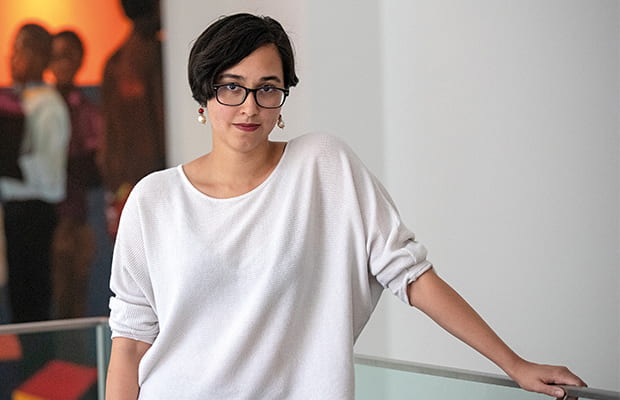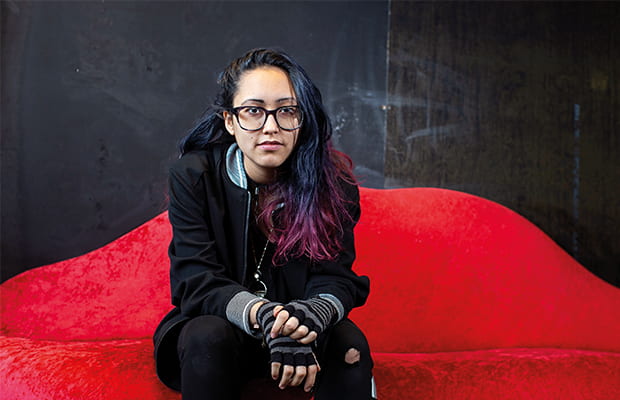Taking on the world
Twins Anchuli Felicia King and Aphiwan Natasha King shared their undergraduate years at the University. But embarking on very different study paths has led to two distinctly successful global careers. They spoke to Lani Thorpe.
NATASHA
Growing up across Thailand, the Philippines and Australia has definitely had an impact on who I am today. I spent most of my childhood and adolescence surrounded by friends and students with a variety of backgrounds and life experiences, so I think I still feel the most comfortable being in that kind of global environment.
From as early as I can remember, I can recall my parents telling me that I would make a good lawyer because I was loud and argumentative. Having been in the company of law students and lawyers for a few years now, I can’t say I see much truth in that stereotype! I have a vague recollection of being convinced for a spell in high school that I wanted to be either an immunologist or maybe a physicist but, overall, I kept coming back to the idea of the law.
After high school, I wasn’t sure if I wanted to commit to pursuing law or go overseas to study. I decided I wasn’t ready to leave Melbourne and all my friends and my sister, so I opted to do a Bachelor of Commerce at the University of Melbourne. I figured it would be a useful degree to have in case I ended up going into corporate law, with the tentative plan that I would probably complete a postgraduate degree in law afterwards.
I absolutely loved my time at Melbourne. It was such an incredible environment to get to be a young adult, figuring out your creative passions and tastes and intellectual interests. I particularly enjoyed getting to do a generalist degree, which allowed me to do courses on everything from the history of economic thought to the development of musical theatre.
‘Leech’ (Felicia) was my roommate and partner in crime throughout our undergrad. We had almost no classes together, but we were collaborating constantly on various student theatre productions. She was typically in a creative role, like an actor or costume designer, and I was typically in a technical role, like a stage manager or lighting designer. The University of Melbourne has the most incredibly diverse and democratic student theatre program.
After finishing at Melbourne, I was lucky enough to be accepted to do an affiliated law degree at the University of Cambridge. After that, I decided to complete a master’s degree at Georgetown in order to specialise in two fields: investor-state arbitration and international trade law. While I was there, a career counsellor encouraged me to apply for an internship at the World Trade Organization. Thankfully, I listened and was fortunate enough to be selected for the internship.
I’m now working at the WTO as a junior dispute settlement lawyer in the Legal Affairs Division, which provides legal advice and information to WTO dispute settlement panels, members, bodies and other WTO divisions. It’s an incredibly interesting role. Now that I actually have gotten to do work that I love, I can’t imagine doing anything else.
Because we ended up on very different career paths, people tend to assume that my sister and I have very different personalities. There’s some truth to that statement; Leech’s always been a bit more of a pathbreaker and non-conformist, whereas I’m basically a grandmother pretending to be a millennial. But I also think that we’re very similar in terms of a lot of our personal traits: workaholism, intellectual curiosity, a hostility towards paternalism. We’re also best friends and rarely go a day without talking.
FELICIA
Natasha and I have been artistic collaborators since we could talk, writing bizarre albums and musicals and screenplays. Our parents definitely expected that the art thing would be a hobby. My mum was gunning for the classic Asian pairing of a doctor and lawyer. The fact that I’ve ended up being a playwright is a real shock actually, because Tash (Natasha) was always the writer of the family. I never thought I’d end up writing for a living.
I wasn’t exactly the most diligent student. I totally loved my undergrad degree, being exposed to a ton of literature and plays and art, but at a certain point my artistic extracurriculars definitely cannibalised my studies. But my time at Melbourne Uni, particularly working in the Union House theatre community, has absolutely shaped who I am as an artist and a human being.
My sister and I lived together for our whole undergrad, down the road from uni. We were doing very different degrees; she was studying commerce and I was studying literature. But we took a bunch of esoteric electives together, like one on the history of Broadway.
Plus, we were constantly collaborating on theatre productions. We split the portfolios; you could get the King Twins as a comprehensive creative team. We actually wrote two musicals together! Tash wrote the book and I wrote the music and lyrics. We toured one to Adelaide Fringe.
“I want to lift up voices and stories that I feel aren’t being represented … I take that really seriously.”
My mantra has always been: pursue your career on every front, keep learning new skills, work your arse off. I often talk about how I accidentally became a playwright, and to an extent that’s true, but I still worked really hard to get here. I was just working hard at everything, and playwriting slowly emerged as the central path. After I graduated from Columbia, I was freelancing as a designer and writing academic papers and working an arts administration job, all while submitting my plays to every festival and playwriting group and prize in existence.
I have also just been preternaturally lucky. And that’s a pretty major caveat. I stumbled around blindly trying to create as much work as I could, and then providence took care of the rest. My major break was getting my first play, White Pearl, on at the Royal Court Theatre main stage this year in London.
A huge part of my job is research and reading. But I also want to make sure that my politics are reflected in my work. I’ve become aggressively globalist in my art-making, in large part as a response to the frightening resurgence of nationalism that I see happening in the world. I want my rehearsal rooms to be global villages. I want to lift up voices and stories that I feel aren’t being represented. I want to increase empathy for other people’s cultures and experiences of the world. I take that really seriously.
I’m dipping my toes into film and TV, but for the moment I’m really just having a wonderful time being an international playwright. But the arts are fickle and it’s pretty hard to plan even six months in advance. As long as I can keep supporting myself as an artist and making work all over the world, I’ll be happy.




